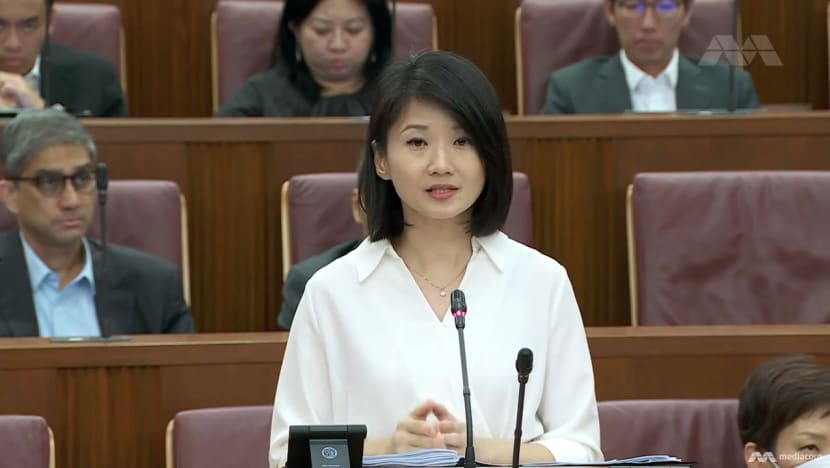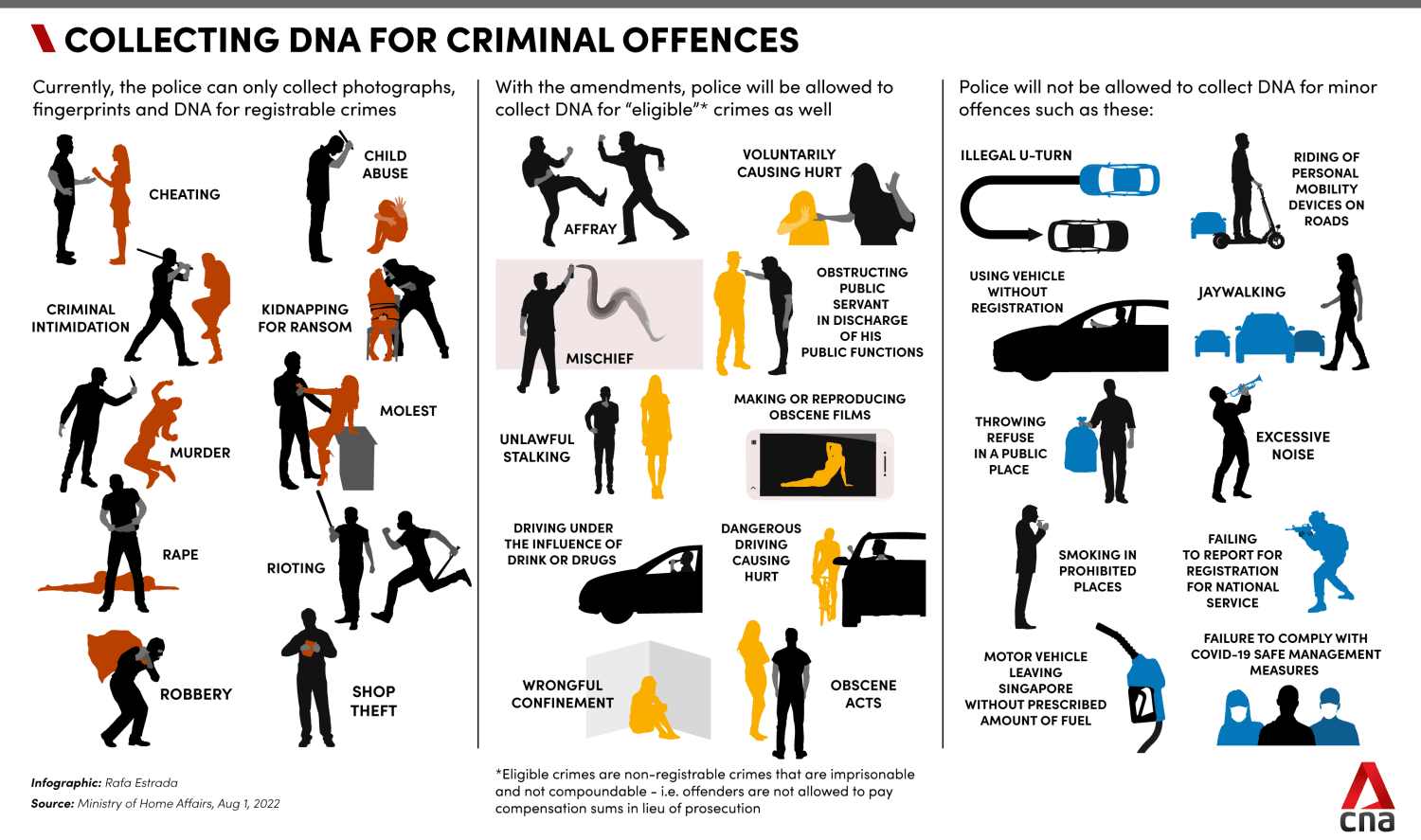Bill allowing police to collect DNA from more people passed as MPs sound privacy, security concerns
The amendments will allow police to collect DNA from people arrested for more crimes, which the Government says will improve its ability to solve crimes.

SINGAPORE: Parliament on Monday (Sep 12) passed a draft law that widens the scope under which police can collect DNA from people under arrest, after Members of Parliament debated the privacy and security concerns surrounding this.
Under the Bill, more crimes will be added to a list for which DNA can be collected from suspects, a move the Government had argued will improve the police’s ability to solve crimes. The current practice of restricting DNA collection to a list of registrable crimes has resulted in a smaller DNA database, said the Government.
Registrable crimes comprise more serious offences like murder, rape, and robbery as well as other offences like shop theft, molestation and cheating.
The Bill will now allow police to collect and store DNA from those arrested for "eligible" crimes like voluntarily causing hurt, drink driving and reproducing obscene films. Eligible crimes, considered more serious, are those that are imprisonable and not compoundable under any written law.
The DNA information can be used for criminal investigations, forensic comparison with other DNA information, and for criminal proceedings.
The Bill will also allow the information to be used to identify a dead individual, and for any investigations and inquiries into a death. It can also be used to identify an individual, who is otherwise unidentified or unable to identify himself.
Minister of State for Home Affairs Sun Xueling pointed out that about one in three individuals convicted of a registrable crime between 2017 and 2021 had been previously convicted of a non-registrable crime.
“If we had been able to collect DNA and identifying information from these individuals when they were convicted of a non-registrable crime, we might have been able to identify them a lot more swiftly, when they later re-offended and committed the registrable crime,” she said in her opening speech on Monday.

But MPs alluded to how the expanded scope for DNA collection could infringe on people’s privacy, and questioned how the sensitive information would be protected.
Leader of the Opposition Pritam Singh (WP-Aljunied) asked how the Government intends to ensure the "secrecy" of the DNA database, cautioning that DNA information could be used to create more comprehensive profiles of people.
“In this era of big data, artificial intelligence and machine learning, the purposes for which the DNA information is collected becomes exceedingly important, something Parliament must scrupulously guard,” he said.
“Seen in this context, the Bill envisages the surrender of private information for which the highest levels of security and access must be assured by the Government.”
MP Denise Phua (PAP-Jalan Besar) asked how authorities decided on the additional list of offences eligible for DNA collection, calling the collection and addition of one’s DNA information to a criminal database a “grave matter”.
“Even if giving up one’s personal data is the consequence of committing a crime, the state should not over-infringe the bounds of a citizen’s privacy rights,” she said.

Ms Sun said in her closing speech that the Government has looked at the DNA collection regime in foreign jurisdictions.
For instance, in the Australian state of South Australia, DNA information is collected for all imprisonable offences, while England collects DNA information for all imprisonable offences and some non-imprisonable offences.
“We did not just adopt wholesale the practices of other countries, but where appropriate, adapted it to suit our context,” she said.
“We have chosen to expand our collection only to offences that are punishable by imprisonment and not compoundable under any written law, unless the offence is specified in the fourth schedule to the Criminal Procedure Code 2010.
“This strikes the appropriate balance in our local context.”
As for security concerns, Ms Sun reiterated that only authorised individuals are allowed to access the DNA database.
“All access is logged and recorded, and there will be an audit trail to detect any data access. The DNA information is stored on a standalone, secured network to prevent unauthorised access,” she said.
“When there is unauthorised access, action will be taken. This could include criminal charges being brought.”
Ms Sun also pointed to an existing framework to manage government data incidents.
“In the event of a data breach, appropriate remedial actions will be taken in accordance with standard operating procedures and workflows,” she added.
Beyond the police’s DNA database, MP Melvin Yong (PAP-Radin Mas) urged the Government to consider establishing a national DNA registry, comprising the DNA sequence of every Singaporean and resident.
“Beyond identifying criminals, a DNA registry can also be helpful in identifying missing victims, or in an event with mass casualties,” he said.
“To the family of a victim in a homicide case, every possible tool to help bring the assailant to justice counts. To deter a potential criminal (and increase) his risk of being caught, counts.”
In response, Ms Sun said the Government would study this suggestion.
REMOVING DNA INFORMATION FROM DATABASE
Some MPs also raised issues with how the Bill requires individuals to apply to remove their DNA information from the database.
Under current law, the police are required to immediately remove an individual’s DNA data from their records if he is subsequently acquitted or discharged by the court, or if his offence is compounded, or if he is found to not be involved in the commission of any crime.
But under the new Bill, this is no longer automatically done and eligible individuals must now apply to have their data removed.
Even so, the police can choose not to do so - when it has reasonable grounds to believe that retaining the DNA is either relevant to other ongoing prosecutions or investigations, or necessary to safeguard national security.
If the police reject the application, the individual can appeal to a reviewing tribunal within 30 days of the police’s determination.
“This current Bill changes the default - from automatic deletion to automatic retention. Why is there a shift in policy? Is it necessitated by a change in the law and order situation?” asked MP Murali Pillai (PAP-Bukit Batok).
“Why is it not preferable for the current mechanism of automatic removal to be maintained? The current system is fair to all, the proposed system appears to benefit those with the resources, the time, and the know-how to request for such a deletion.”
To this, Ms Sun replied that the database’s purpose is to assist in solving crime.
“When the acquitted accused applies to have his information removed, we will remove it except under two circumstances,” she said.
“Subject to that, it is in society's interest that there is a larger database of DNA. The DNA has to be collected and retained in acceptable ways.”
MPs Louis Ng (PAP-Nee Soon) and Sharael Taha (PAP-Pasir Ris-Punggol) also asked for more details on the process of seeking data removal.
Ms Sun noted that an individual will have to apply for removal online with their particulars and case details. The registrar will then review the application and provide an official reply within 30 days.
Details of the application process will be made available on SPF’s website in due course, she added.
“When the registrar rejects … an individual's application to remove his (DNA) from the database, the registrar will notify the applicant and state the reasons for the rejection,” she said.
“If his data has been retained because there is an ongoing prosecution or investigation, the individual should be aware when these are concluded, such that he may reapply for expungement.”
If the person’s data is retained due to national security concerns, authorities will not be able to inform him when these concerns no longer exist, Ms Sun said.
“If he disagrees with the decision of the registrar, he can appeal to the reviewing tribunal. Even if the reviewing tribunal dismisses the appeal, the individual may be applied for removal at any time,” she said.















